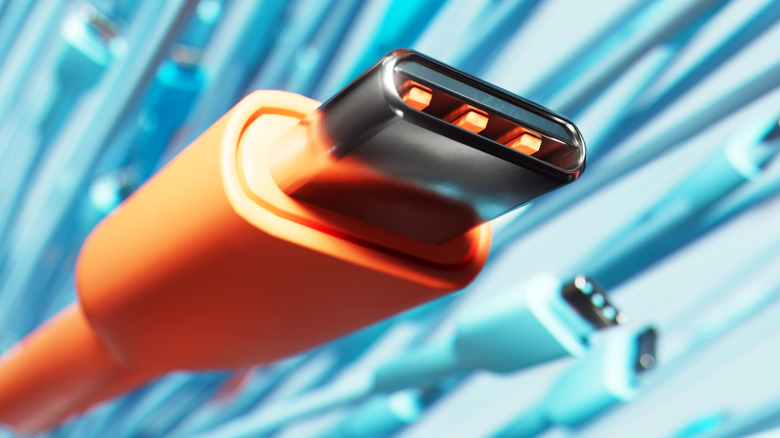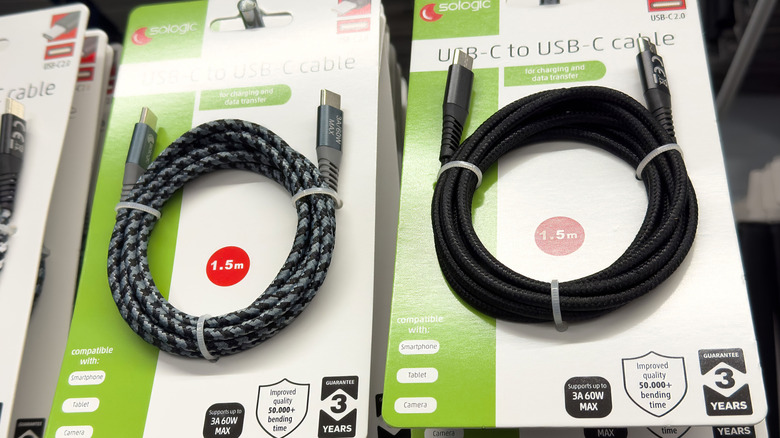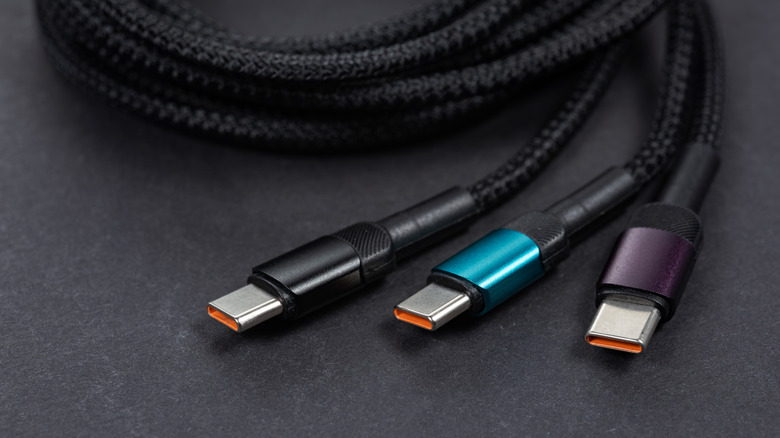How To Find The Best USB-C Cable For Your Devices (And Avoid The Bad Ones)
USB Type-C, also known as USB-C, is quickly becoming the connector of choice for a wide range of devices, including computers, peripherals, portable storage drives, and smartphones. It's compact, reversible, and versatile; you can use it to transfer data, power, and video signals. Thanks to these capabilities, even Thunderbolt, which is a hardware interface developed by Intel and separate from USB, now uses the USB-C connector.
One of the biggest roles in the USB-C ecosystem is played by cables, which we use to connect different USB-C devices. Unfortunately, not all USB-C cables are made equal, and it can be tricky to figure out exactly which cable is suitable for your needs. It's also common to encounter badly manufactured or fake cables that, in the best-case scenario, refuse to work, or in the worst-case scenario, cause permanent harm to the connected devices. So, it's best to identify and purchase high-quality cables for your devices — even if they cost more.
How to avoid counterfeit USB-C cables
One of the easiest ways to ensure you're getting an authentic USB-C cable, especially when shopping online, is to stick to reputable brands, as there is no dearth of no-name and alphabet soup brands on websites like Amazon. Some of the popular and trusted manufacturers making USB-C cables include Anker, Belkin, Cable Matters, Infinite Cables, and Spigen. Device manufacturers like Apple, Beats, Lenovo, and Samsung also sell their first-party cables. Once you pick a product from any of these brands, ensure that it is being sold directly by the brand or via an official reseller to avoid counterfeits.
Beyond the branding, a good indicator of a legitimate USB-C cable is the USB-IF (USB Implementers Forum) certification. USB-IF is the organization responsible for developing and maintaining the USB specification. It runs a certification program to highlight products that meet the USB specification. The USB-IF certification is typically mentioned in the product marketing material and on the product packaging, which makes it slightly easier for consumers to identify what they are buying. However, it's not unheard of for unscrupulous manufacturers to mention USB-IF certification even when their cables are not certified, which is why USB-IF has a handy product search page on its website that includes information about every USB-IF certified product from the last two years.
How to find the right USB-C cable for your needs
There are typically three purposes for which people buy a USB-C cable: charging, data transfer, or video output. However, not all USB-C cables are compatible with all three use cases. So, it's important to carefully select the USB-C cable for your specific requirements. If you want a USB-C charging cable, you'll have to ensure the power delivery capabilities of the cable match your device's charging requirements. Cable manufacturers typically mention the wattage supported by a charging cable, such as 60W (3A), 100W (5A), or 240W (5A). However, if data transfer is your primary need, you'll have to specifically confirm data transfer speeds in cable specifications, as most charging cables are limited to USB 2.0 speeds (480 Mbps).
For faster data transfer, it's best to go with USB 3.2 Gen 1 (5Gbps), USB 3.2 Gen 2 (up to 20Gbps), or USB4 (up to 40Gbps) cables. Similarly, not every USB-C cable supports video output. So, if you are planning to use a USB-C cable to connect your laptop or another device to a monitor, you'll want a cable that explicitly mentions that it supports video out. Finally, if you're buying a Thunderbolt cable, you can't randomly pick any USB-C cable; you'll have to check for Thunderbolt and Thunderbolt version support. Intel Thunderbolt certification is a good way to ensure you get an authentic Thunderbolt cable.


